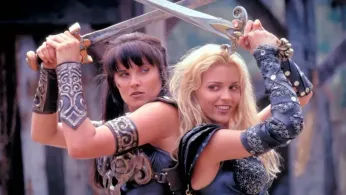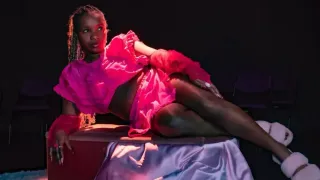
3 hours ago
Three Decades of Xena: The Warrior, The Legend, The Queer Icon
READ TIME: 3 MIN.
When "Xena: Warrior Princess" first slashed onto television screens in September 1995, it quickly distinguished itself from the male-dominated genre shows of its era. The series starred Lucy Lawless as Xena, a reformed warlord seeking redemption, and Renee O’Connor as Gabrielle, her steadfast companion whose journey mirrored viewers’ own quests for identity and belonging. At a time when explicit queer representation was nearly absent from mainstream television, Xena and Gabrielle’s relationship provided a beacon to LGBTQ+ audiences, even though the show’s creators were constrained by prevailing industry norms and censorship.
Though the subtext of Xena and Gabrielle’s bond was never made fully explicit in the original run, creators, actors, and fans alike have openly acknowledged the romantic and emotional intimacy at the show’s core. Executive producer R.J. Stewart reflected, “In the olden days, when people asked me if Xena and Gabrielle were gay, I used to say, ‘I’ll leave that up to the fans.’ But 30 years later, the fans have spoken. They’re definitely gay now”.
The 1990s were a period of both innovation and constraint in American television. The Defense of Marriage Act was signed into law in 1996, just one year into Xena’s run, and would not be overturned until more than a decade after the show’s finale. Against this backdrop, the show’s creative team walked a precarious line between queer suggestion and plausible deniability. Despite this, the writers and actors leaned into the lesbian subtext, infusing scenes with affection, longing, and love—offering LGBTQ+ viewers resonant moments rarely found elsewhere in popular media.
Lucy Lawless has stated that she and O’Connor focused on portraying “love in the scene,” rather than narrowly defining it by sexuality. For many fans, the relationship’s ambiguity was both a source of frustration and a lifeline. As one fan recounted in a 2001 survey, “Seeing Gabrielle’s unconditional love for Xena week after week … overturns this entire Negative Order so many of us find ourselves in. X&G represent hope”.
Beyond the screen, Xena: Warrior Princess catalyzed the formation of a robust queer fandom. As the internet became more widely accessible in the late 1990s, fans—dubbed “Xenites”—built online communities, wrote fanfiction, and organized conventions that provided safe spaces for LGBTQ+ expression and connection. In these digital spaces, the subtextual romance could be celebrated, reinterpreted, and made explicit, long before such narratives were possible on network TV.
The influence of Xena’s queer fandom has been enduring and profound. “Queer Fandom began to crystalize culturally” around the show, according to a panel hosted by the American LGBTQ+ Museum, which chronicled how Xena’s popularity led to the blossoming of dedicated queer spaces both online and at conventions. These communities not only empowered fans to see themselves reflected in heroic narratives but also set the stage for later fandoms around shows with more overt LGBTQ+ representation.
Xena: Warrior Princess’s legacy is complex. While it never fully delivered the open queer representation craved by many fans, it nonetheless provided a rare model of same-sex devotion and partnership during a time when such stories were largely invisible or marginalized in mainstream media. The show’s willingness to “embrace the lesbian subtext with unbridled glee” remains noteworthy, especially given the period’s climate of censorship and risk aversion.
In the decades since, television and film have made significant strides in representing LGBTQ+ identities more openly and authentically. Yet, as critics note, progress is uneven, and mainstream media often still relegates queer intimacy to the margins or treats it as an afterthought. Xena’s story serves as both a testament to what was possible even under restriction and a reminder of the work that remains.
Today, new generations continue to discover Xena: Warrior Princess, drawn not only to its campy humor and action but also to the heart of its story: two women, bound by love and loyalty, fighting for a better world. As Xena herself once said, the magic ingredient is always love—and that is a legacy worthy of celebration.






